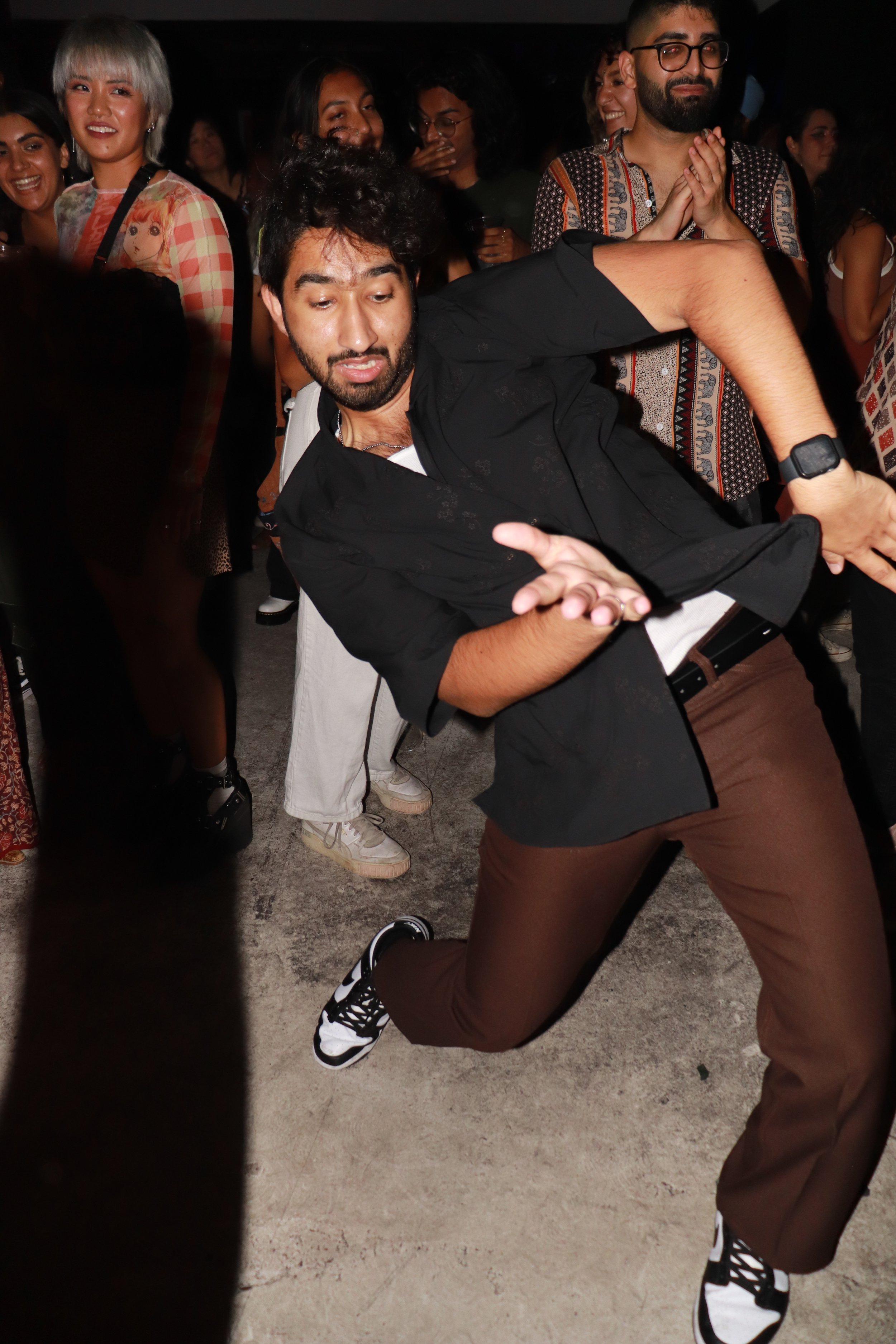Sights Set on No Nazar
⤏ IN LA’S UNDERGROUND, NO NAZAR SPOTLIGHTS SOUTH ASIAN MUSIC AND CULTURE
⤏ PHOTOS AND REPORTING BY JIREH DENG
It’s a late Saturday evening in September, nearing the seventh hour since No Nazar’s “Endless Summer” day party at the Melrose House started in the early afternoon. But there’s no sense of lagging or exhaustion from the packed crowd. In between songs, cheers and hollers erupt when individuals recognize that a DJ has put their own spin on a classic Bollywood tune.
No Nazar, a DJ collective based in Los Angeles, was started two years ago by Bianca Maieli, Malinder Tooray and Omar Ahmed. The trio set out to create a new party highlighting South Asian music and culture.
Their name is derived from the Hindi and Arabic word nazar meaning both “sight” or a talisman against misfortune and negativity. It's been in the underground, outside the gaze of a dominant white music industry, where No Nazar’s monthly parties have blossomed and found a diverse audience that resonates with the diasporic themes that find their way into their beats.
Over the past two years, COVID-19 shut down in-person gatherings, but No Nazar has been plotting a comeback to the party scene. As restrictions lifted, their dance floors were filled with young South Asian Americans hungry to hear their culture represented in the music they danced to.
A night with No Nazar requires your sexiest and most comfortable shoes. It’s almost impossible to resist the kinetic energy flowing from the music that makes people dance until they forget that hours have passed. It’s true that everyone’s hotter when they’re unapologetically themselves. And in a room where South Asian art is celebrated, there’s infectious confidence in the unabashed joy of attendees who are surrounded by their peers.
“When I first started, I didn't see how Bollywood or South Asian songs can fit into the current pop culture scene,” said Sudi Shankar, one of No Nazar’s resident DJs. “Seeing all these other South Asians doing it in music is empowering. [Now] we have this sense of belonging that our music does belong in the club scene and we can adapt.”
No Nazar’s DJs don’t limit themselves to drawing inspiration from South Asian culture. Their sounds travel the globe between Brazil’s baile funk, Islamic influences from the Middle East and South Africa’s amapiano. Their resident DJs all carry their own unique flair from their respective backgrounds.
Malinder draws on past years as a dhol drummer to find her rhythm. Bianca's South Asian and Colombian heritage is reflected in her sets. Sudi produces songs for AfroDesi, an international dance and music collective that draws from Afrobeats and Bollywood. Omar has moved between New Jersey to Atlanta and now L.A. picking up styles along the way like Jersey Club.
“When I first started, I didn't see how Bollywood or South Asian songs can fit into the current pop culture scene.”
— Sudi Shankar
No Nazar’s mixes are the backdrops to the safe and inclusive environments they curate. Although No Nazar isn’t explicitly marketed as a queer event, the co-founders Bianca and Malinder are two queer South Asian women, born and raised in Los Angeles, who make it their goal that all their attendees feel welcome to express themselves freely.
For fans like Solmaz, her appreciation for No Nazar stems from her experiences as a string musician and queer woman. In this story, she requested that only her first name be used out of concern for her own safety. She recognizes that the event coordinators have created a sacred haven where queer people of color are centered whereas in other spaces they might be marginalized.
“Queer music aesthetic is the music where queer people are present and participating and enjoying it,” said Solmaz of No Nazar.
Inclusivity has also been a key to their success in reaching a wider audience. While there are other spaces that highlight South Asian talent like dhol drumming competitions and bhangra dance studios, No Nazar has been steadily gaining traction in a mainstream way. This year they were the first ever South Asian act to perform at L.A. Pride and their showcase at Boiler Room in August sold out of tickets.
Bianca is proud of the fact that No Nazar often invites other artists of color to play sets at all their events as an intentional act to draw diverse crowds and introduce different music to their home audience. Growing up in L.A. has given her ear an affinity for the sound landscape that encompasses its range.
“There have been some really cool events that are catered specifically to other South Asians, but I just haven’t seen them be as diverse as ours. I'm very grateful they exist,” said Bianca. “I think we just saw an opportunity to meld the different music scenes that we were all a part of. We're a part of so many of them here in L.A., there's something for everyone here.”
No Nazar has collaborated with other music collectives like Pangea Sound and Subsuelo which host their own regular dance parties in L.A. Malinder dreams of seeing No Nazar’s influence expanding further in L.A.’s club scene to partner with events like Everyday People and gaining invitations to perform internationally.
Shivaani Sharma has been friends with Malinder for several years now, connected by the informal networks of the brown community in L.A. She attended No Nazar’s warehouse party back in July and remembers No Nazar’s conception when it was simply a gathering of friends.
“[No Nazar] started from a place of community and it has remained in that space,” said Sharma. “They've done a really good job of still maintaining that essence where you'll still see all of us who have been here from day one… but there are so many other communities that have been tied together by this one experience.”
Across these spaces, they have a loyal fan base, who come out and support them at every event they’ve hosted. Malinder said they've played an integral role in continuing to make No Nazar grounded in the intimacy of a community even as their platform has grown larger.
“Sudi’s girlfriend Divia, [brings] her friends, but she goes around as well meeting new people that come for the first time. Bianca's wife, Saima, [makes] sure that everybody's okay. Having our dancer that comes all that time, aka [our friend] Chitra. She creates spaces for people to feel good and that goes a long way,” said Malinder.
“[We] have five incredible DJs, but we have incredible partners and friends that believe in us as well, which makes that room feel more loved.”
You can follow No Nazar’s updates for their monthly parties on Instagram @nonazar.la








